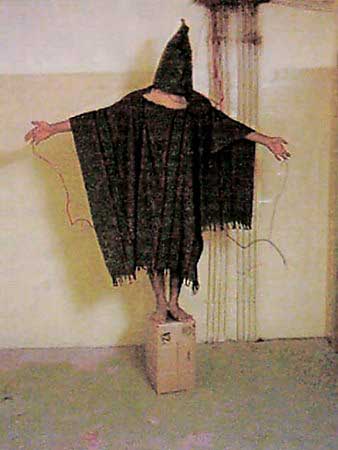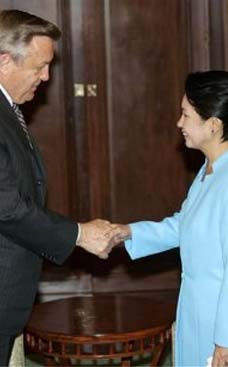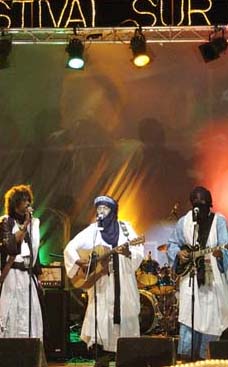2007.05.17: May 17, 2007: Headlines: Speaking Out: Torture: Values: Washington Post: Charles C. Krulak and Joseph P. Hoar write: Torture Betrays Us and Breeds New Enemies
Peace Corps Online:
Peace Corps News:
Peace Corps Library:
Values:
2007.05.17: May 17, 2007: Headlines: Speaking Out: Torture: Values: Washington Post: Charles C. Krulak and Joseph P. Hoar write: Torture Betrays Us and Breeds New Enemies
Charles C. Krulak and Joseph P. Hoar write: Torture Betrays Us and Breeds New Enemies

The American people are understandably fearful about another attack like the one we sustained on Sept. 11, 2001. But it is the duty of the commander in chief to lead the country away from the grip of fear, not into its grasp. Regrettably, at Tuesday night's presidential debate in South Carolina, several Republican candidates revealed a stunning failure to understand this most basic obligation. Indeed, among the candidates, only John McCain demonstrated that he understands the close connection between our security and our values as a nation. This war will be won or lost not on the battlefield but in the minds of potential supporters who have not yet thrown in their lot with the enemy. If we forfeit our values by signaling that they are negotiable in situations of grave or imminent danger, we drive those undecideds into the arms of the enemy. This way lies defeat, and we are well down the road to it. This is not just a lesson for history. Right now, White House lawyers are working up new rules that will govern what CIA interrogators can do to prisoners in secret. Those rules will set the standard not only for the CIA but also for what kind of treatment captured American soldiers can expect from their captors, now and in future wars. Before the president once again approves a policy of official cruelty, he should reflect on that. It is time for us to remember who we are and approach this enemy with energy, judgment and confidence that we will prevail. That is the path to security, and back to ourselves.
Charles C. Krulak and Joseph P. Hoar write: Torture Betrays Us and Breeds New Enemies
It's Our Cage, Too
Torture Betrays Us and Breeds New Enemies
By Charles C. Krulak and Joseph P. Hoar
Thursday, May 17, 2007; A17
Fear can be a strong motivator. It led Franklin Roosevelt to intern tens of thousands of innocent U.S. citizens during World War II; it led to Joseph McCarthy's witch hunt, which ruined the lives of hundreds of Americans. And it led the United States to adopt a policy at the highest levels that condoned and even authorized torture of prisoners in our custody.
Fear is the justification offered for this policy by former CIA director George Tenet as he promotes his new book. Tenet oversaw the secret CIA interrogation program in which torture techniques euphemistically called "waterboarding," "sensory deprivation," "sleep deprivation" and "stress positions" -- conduct we used to call war crimes -- were used. In defending these abuses, Tenet revealed: "Everybody forgets one central context of what we lived through: the palpable fear that we felt on the basis of the fact that there was so much we did not know."
We have served in combat; we understand the reality of fear and the havoc it can wreak if left unchecked or fostered. Fear breeds panic, and it can lead people and nations to act in ways inconsistent with their character.
The American people are understandably fearful about another attack like the one we sustained on Sept. 11, 2001. But it is the duty of the commander in chief to lead the country away from the grip of fear, not into its grasp. Regrettably, at Tuesday night's presidential debate in South Carolina, several Republican candidates revealed a stunning failure to understand this most basic obligation. Indeed, among the candidates, only John McCain demonstrated that he understands the close connection between our security and our values as a nation.
Tenet insists that the CIA program disrupted terrorist plots and saved lives. It is difficult to refute this claim -- not because it is self-evidently true, but because any evidence that might support it remains classified and unknown to all but those who defend the program.
These assertions that "torture works" may reassure a fearful public, but it is a false security. We don't know what's been gained through this fear-driven program. But we do know the consequences.
As has happened with every other nation that has tried to engage in a little bit of torture -- only for the toughest cases, only when nothing else works -- the abuse spread like wildfire, and every captured prisoner became the key to defusing a potential ticking time bomb. Our soldiers in Iraq confront real "ticking time bomb" situations every day, in the form of improvised explosive devices, and any degree of "flexibility" about torture at the top drops down the chain of command like a stone -- the rare exception fast becoming the rule.
To understand the impact this has had on the ground, look at the military's mental health assessment report released earlier this month. The study shows a disturbing level of tolerance for abuse of prisoners in some situations. This underscores what we know as military professionals: Complex situational ethics cannot be applied during the stress of combat. The rules must be firm and absolute; if torture is broached as a possibility, it will become a reality.
This has had disastrous consequences. Revelations of abuse feed what the Army's new counterinsurgency manual, which was drafted under the command of Gen. David Petraeus, calls the "recuperative power" of the terrorist enemy.
Former defense secretary Donald Rumsfeld once wondered aloud whether we were creating more terrorists than we were killing. In counterinsurgency doctrine, that is precisely the right question. Victory in this kind of war comes when the enemy loses legitimacy in the society from which it seeks recruits and thus loses its "recuperative power."
The torture methods that Tenet defends have nurtured the recuperative power of the enemy. This war will be won or lost not on the battlefield but in the minds of potential supporters who have not yet thrown in their lot with the enemy. If we forfeit our values by signaling that they are negotiable in situations of grave or imminent danger, we drive those undecideds into the arms of the enemy. This way lies defeat, and we are well down the road to it.
This is not just a lesson for history. Right now, White House lawyers are working up new rules that will govern what CIA interrogators can do to prisoners in secret. Those rules will set the standard not only for the CIA but also for what kind of treatment captured American soldiers can expect from their captors, now and in future wars. Before the president once again approves a policy of official cruelty, he should reflect on that.
It is time for us to remember who we are and approach this enemy with energy, judgment and confidence that we will prevail. That is the path to security, and back to ourselves.
Charles C. Krulak was commandant of the Marine Corps from 1995 to 1999. Joseph P. Hoar was commander in chief of U.S. Central Command from 1991 to 1994.
Links to Related Topics (Tags):
Headlines: May, 2007; Speaking Out; Values; Values; The Peace Corps Library; Peace Corps History; Bulletin Board; Recent Peace Corps News
When this story was posted in May 2007, this was on the front page of PCOL:





Peace Corps Online The Independent News Forum serving Returned Peace Corps Volunteers
 | PCOL serves half million
PCOL's readership for April exceeded 525,000 visitors - a 50% increase over last year. This year also saw the advent of a new web site: Peace Corps News that together with the Peace Corps Library and History of the Peace Corps serve 17,000 RPCVs, Staff, and Friends of the Peace Corps every day. Thanks for making PCOL your source of news for the Peace Corps community. Read more. |
 | Suspect confesses in murder of PCV
Search parties in the Philippines discovered the body of Peace Corps Volunteer Julia Campbell near Barangay Batad, Banaue town on April 17. Director Tschetter expressed his sorrow at learning the news. “Julia was a proud member of the Peace Corps family, and she contributed greatly to the lives of Filipino citizens in Donsol, Sorsogon, where she served,” he said. Latest: Suspect Juan Duntugan admits to killing Campbell. Leave your thoughts and condolences . |
 | Warren Wiggins: Architect of the Peace Corps
Warren Wiggins, who died at 84 on April 13, became one of the architects of the Peace Corps in 1961 when his paper, "A Towering Task," landed in the lap of Sargent Shriver, just as Shriver was trying to figure out how to turn the Peace Corps into a working federal department. Shriver was electrified by the treatise, which urged the agency to act boldly. Read Mr. Wiggins' obituary and biography, take an opportunity to read the original document that shaped the Peace Corps' mission, and read John Coyne's special issue commemorating "A Towering Task." |
 | Chris Dodd's Vision for the Peace Corps
Senator Chris Dodd (RPCV Dominican Republic) spoke at the ceremony for this year's Shriver Award and elaborated on issues he raised at Ron Tschetter's hearings. Dodd plans to introduce legislation that may include: setting aside a portion of Peace Corps' budget as seed money for demonstration projects and third goal activities (after adjusting the annual budget upward to accommodate the added expense), more volunteer input into Peace Corps operations, removing medical, healthcare and tax impediments that discourage older volunteers, providing more transparency in the medical screening and appeals process, a more comprehensive health safety net for recently-returned volunteers, and authorizing volunteers to accept, under certain circumstances, private donations to support their development projects. He plans to circulate draft legislation for review to members of the Peace Corps community and welcomes RPCV comments. |
 | He served with honor
One year ago, Staff Sgt. Robert J. Paul (RPCV Kenya) carried on an ongoing dialog on this website on the military and the peace corps and his role as a member of a Civil Affairs Team in Iraq and Afghanistan. We have just received a report that Sargeant Paul has been killed by a car bomb in Kabul. Words cannot express our feeling of loss for this tremendous injury to the entire RPCV community. Most of us didn't know him personally but we knew him from his words. Our thoughts go out to his family and friends. He was one of ours and he served with honor. |
 | Peace Corps' Screening and Medical Clearance
The purpose of Peace Corps' screening and medical clearance process is to ensure safe accommodation for applicants and minimize undue risk exposure for volunteers to allow PCVS to complete their service without compromising their entry health status. To further these goals, PCOL has obtained a copy of the Peace Corps Screening Guidelines Manual through the Freedom of Information Act (FOIA) and has posted it in the "Peace Corps Library." Applicants and Medical Professionals (especially those who have already served as volunteers) are urged to review the guidelines and leave their comments and suggestions. Then read the story of one RPCV's journey through medical screening and his suggestions for changes to the process. |
 | The Peace Corps is "fashionable" again
The LA Times says that "the Peace Corps is booming again and "It's hard to know exactly what's behind the resurgence." PCOL Comment: Since the founding of the Peace Corps 45 years ago, Americans have answered Kennedy's call: "Ask not what your country can do for you--ask what you can do for your country. My fellow citizens of the world: ask not what America will do for you, but what together we can do for the freedom of man." Over 182,000 have served. Another 200,000 have applied and been unable to serve because of lack of Congressional funding. The Peace Corps has never gone out of fashion. It's Congress that hasn't been keeping pace. |
 | PCOL readership increases 100%
Monthly readership on "Peace Corps Online" has increased in the past twelve months to 350,000 visitors - over eleven thousand every day - a 100% increase since this time last year. Thanks again, RPCVs and Friends of the Peace Corps, for making PCOL your source of information for the Peace Corps community. And thanks for supporting the Peace Corps Library and History of the Peace Corps. Stay tuned, the best is yet to come. |
 | History of the Peace Corps
PCOL is proud to announce that Phase One of the "History of the Peace Corps" is now available online. This installment includes over 5,000 pages of primary source documents from the archives of the Peace Corps including every issue of "Peace Corps News," "Peace Corps Times," "Peace Corps Volunteer," "Action Update," and every annual report of the Peace Corps to Congress since 1961. "Ask Not" is an ongoing project. Read how you can help. |
Read the stories and leave your comments.

Some postings on Peace Corps Online are provided to the individual members of this group without permission of the copyright owner for the non-profit purposes of criticism, comment, education, scholarship, and research under the "Fair Use" provisions of U.S. Government copyright laws and they may not be distributed further without permission of the copyright owner. Peace Corps Online does not vouch for the accuracy of the content of the postings, which is the sole responsibility of the copyright holder.
Story Source: Washington Post
This story has been posted in the following forums: : Headlines; Speaking Out; Torture; Values
PCOL37527
79




















